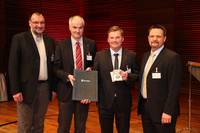UniCat Professor Dr. Peter Strasser of the TU Berlin has received the Otto Roelen Medal 2016 at the Annual Meeting of German Catalysis Experts in Weimar.

At the award ceremony (from left): Prof. Martin Muhler (Ruhr-Universität Bochum), Dr. Christoph Gürtler (Covestro Deutschland AG), Prof. Peter Strasser (TU Berlin), and Dr. Marcel Ahijado Salomon (OXEA GmbH); photograph © DECHEMA
With the award, the DECHEMA (Society for Chemical Engineering and Biotechnology) and the German Catalysis Society honor his pioneering work contributing to the discovery of highly active bimetallic core-shell catalysts. Fuel cells can thus be used as an affordable and sustainable source of energy, for example, for hydrogen-powered vehicles.
For many years, fuel cells have been investigated as an alternative source of energy. Together with hydrogen and atmospheric oxygen, they can be used to produce electrical energy. This method is very environmentally friendly, as its only byproduct is water. In order for the reaction to take place, however, expensive platinum is needed as catalyst.
Peter Strasser was able to develop catalysts that are not only better, but also cheaper than the precious metal. He developed a nanomaterial with a core consisting of a copper-nickel alloy and extremely thin platinum coating. This catalyst is many times more effective than the pure platinum that has been used until now.
Peter Strasser’s research focuses on the areas of physical chemistry, material sciences, and the catalysis of electrically charged solid-liquid interfaces. Next to basic research on electrocatalytic reaction mechanisms and fundamental structure-activity-relationships, his work focuses on the industrial transfer of electrochemical processes that are relevant in regard to the conversion and storage of renewable energies.
Peter Strasser studied chemistry at the University of Tübingen, Stanford University, USA, and at Pisa University, Italy. In 1996, he spent one year as visiting researcher at Sony Central Research in Yokohama, Japan. In 1999 he completed his doctoral studies under the supervision of Prof. Gerhard Ertl (Nobel laureate 2007) in physical chemistry and electrochemistry at the Fritz Haber Institute of the Max Planck Society in Berlin. In the same year, Peter Strasser received the Max Planck Society’s Otto Hahn Medal. From 2001 to 2004, he was active at Symyx Technologies in Santa Clara, USA in the area of electronic materials / heterogeneous catalysis. He then switched to the University of Houston, USA as Assistant Professor for “Chemical Engineering”. In 2007 he became Full Professor in Chemical Engineering at the TU Berlin, where he heads the “Electrochemical Catalysis, Energy, and Materials Science Laboratory”.
DECHEMA’s Otto Roelen Medal endowed by Oxea with Euro 5,000 has been regularly awarded every other year since 1997. The Medal honors outstanding scientific achievements in the area of catalysis with great industrial relevance. The award ceremony took place on March 17, 2016 at the Annual Meeting of German Catalysis Experts in Weimar.
The German Catalysis Society (GeCatS) serves as platform for the entire German catalysis community in the area of research and application. It includes about 1,100 members in industry and academia. The German Catalysis Society is supported by DECHEMA, VDI-GVC, GDCh, DGMK, and DBG. The Otto Roelen Medal is usually awarded every other year in honor of outstanding research achievements in the area of catalysis with great industrial relevance.
